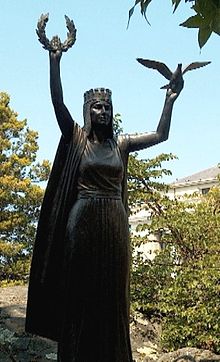Mackenzie-Papineau Battalion
| Mackenzie–Papineau Battalion | |
|---|---|

Monument to the Mackenzie Papineau Battalion in Victoria, B.C.
|
|
| Active | 1937-1938 |
| Country | Canada |
| Allegiance |
|
| Type | Battalion - Infantry |
| Role | Home Defence |
| Part of |
|
| Engagements |
Spanish Civil War *Battle of Jarama |
The Mackenzie–Papineau Battalion or Mac-Paps were a battalion of Canadians who fought as part of the XV International Brigade on the Republican side in the Spanish Civil War. Except for France, no other country gave a greater proportion of its population as volunteers in Spain than Canada. The first Canadians in the conflict were dispatched mainly with the U.S. Abraham Lincoln Battalion and later the North American George Washington Battalion, with about forty Canadians serving in each group. The XV International Brigade was involved in the Battle of Jarama in which nine Canadians are known to have been killed.
By summer 1937 some 1,200 Canadians were involved in the conflict and a separate battalion was formed for them in early May. Two months later it was named for William Lyon Mackenzie and Louis-Joseph Papineau, who led the 1837 Rebellions. The battalion was formed at Albacete, Spain under the command of Edward Cecil-Smith, a Montreal-based journalist and trade union organizer.
The soldiers who would make up the Mackenzie–Papineau Battalion came from Canada and the United States. Initially, there was a debate, whether a third American battalion should be formed and in the beginning the Americans outnumbered the Canadians 2 to 1. It was only later that the Canadians made up about half of the unit. Unlike Britain and the United States, where a significant number of students and intellectuals enlisted, the Canadian contingent was almost wholly working class. Labourers had been driven to the left by their experiences during the Great Depression.
Canadian volunteers included members of the Communist Party. In general, the respondents were self-educated about the conflict in Spain, and about the possible repercussions for democracy in Europe and the world. Many other moderate groups also supported the Spanish Republicans and organized the Committee to Support Spanish Democracy. A good percentage of those who enlisted had been born in Europe, the two largest groups being Finns and Ukrainians. As casualties mounted many Spanish volunteers and later conscripts were incorporated into the unit.
...
Wikipedia
